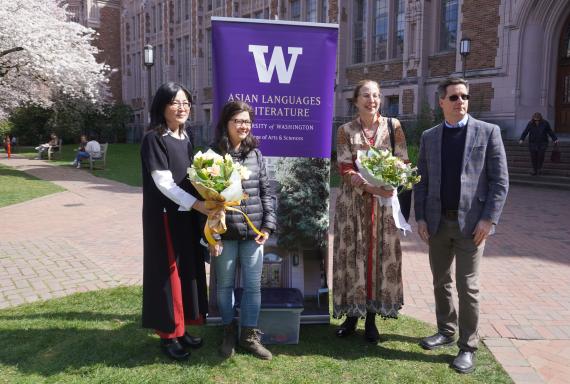On March 30 Asian L&L faculty, students, and staff gathered together in the miraculously sunny quad to celebrate spring and the beautiful cherry blossoms with poetry.
After brief welcome remarks by Zev Handel, Paul Atkins started the celebration off by sharing two versions of a poem by Kobayashi Issa:
Author: Kobayashi Issa 小林一茶 (1763-1828)
Version 1 (dated 1817)
kimi nakute makoto ni tada no kodachi ka na
君なくて誠にただの木立哉
Without you
they really are just
a bunch of trees
Version 2 (no date)
kimi nakute makoto ni tada no sakura ka na
君なくて誠にただの桜哉
Without you
they really are just
cherry blossoms
Then Heidi Pauwels recited a selection of lines from Jayadeva’s Gīta-govinda:
Jayadeva’s Gīta-govinda “The Cowherd’s Song” (12C Bengal) in Sanskrit
Translation: Miller, Barbara Stoler. 1997.
Love song of the dark lord: Jayadeva’s Gītagovinda.
Columbia University Press.
When spring’s mood is rich, Hari roams here
To dance with young women, friend—
A cruel time for deserted lovers
1.
Soft sandal mountain winds caress quivering vines of clove.
Forest huts hum with droning bees and crying cuckoos.
5.
Tender buds bloom into laughter as creatures abandon modesty.
Cactus buds pierce the sky to wound deserted lovers.
8.
Jayadeva’s song evokes the potent memory of Hari’s feet,
Coloring the forest in springtime mood heightened by love’s presence.
Text : Lee Siegel. 2009. Gītagovinda: Love Songs of Rādhā and Krsna. New York University Press.
viharati harir iha sarasa-vasante
nṛtyati yuvati-janena samaṃ sakhi virahi-janasya durante
1
lalita-lavaṅga-latā-pariśīlana-komala-malaya-samīre
madhukara-nikara-karambita-kokila-kūjita-kuñja-kuṭīre
5
vigalita-lajjita-jagad-avalokana-taruṇa-karuṇa-kṛta-hāse
virahi-nikṛntana-kunta-mukhākṛti-ketaka-danturitāśe
8
śrī-jayadeva-bhaṇitam idam udayati hari-caraṇa-smṛti-sāram
sarasa-vasanta-samaya-vana-varṇanam anugata-madana-vikāram
Next, Wang Ping invited everyone present to join in as she read "Táo Yāo" (from the ancient Chinese poetry collection The Book of Odes) aloud:
桃夭
桃之夭夭、灼灼其华。
之子于归、宜其室家。
桃之夭夭、有蕡其实。
之子于归、宜其家室。
桃之夭夭、其叶蓁蓁。
之子于归、宜其家人
The Peach Tree Tender
The peach tree budding and tender,
Vivid and bright its flowers.
This girl is going to be married,
And fit for her chamber and house.
The peach tree budding and tender,
Quite large its fruit.
This girl is going to be married,
And fit for her house and chamber.
The peach tree budding and tender,
Its leaves luxuriant and lush.
This girl is going to be married,
And fits with all in the family.
Translation by William H Nienhauser Jr.
(How to Read Chinese Poetry, ed., Zong-Qi Cai. CUP. 2008. P. 16.)
And finally, Bich-Ngoc Turner shared "Ông Đồ" by Vũ Đình Liên:
Title: Ông Đồ (The Calligrapher)
By Vũ Đình Liên
1936
(Translated by Bich-Ngoc Turner)
Vietnamese original:
Mỗi năm hoa đào nở
Lại thấy ông đồ già
Bày mực Tàu, giấy đỏ
Bên phố đông người qua
Bao nhiêu người thuê viết
Tấm tắc ngợi khen tài:
“Hoa tay thảo những nét
Như phượng múa, rồng bay”
Nhưng mỗi năm mỗi vắng
Người thuê viết nay đâu?
Giấy đỏ buồn không thắm
Mực đọng trong nghiên sầu...
Ông đồ vẫn ngồi đấy
Qua đường không ai hay
Lá vàng rơi trên giấy
Ngoài trời mưa bụi bay
Năm nay đào lại nở
Không thấy ông đồ xưa
Những người muôn năm cũ
Hồn ở đâu bây giờ?
English translation:
Each year when the peach blossom would bloom
The calligrapher would be seen again
Setting out his red papers, black ink
On the sidewalk full of passers-by
So many hired him to write
Praising his unique gift
“Such beautiful penmanship,
Like a phoenix dancing, a dragon flying”
But each year now fewer still
Where did the patrons of letters go?
Sad, red papers reluctant to shine
Black ink lays still in the tray
The calligrapher still sits
but no one on the street takes notice
Yellow leaves fall on the papers
Out in the drizzling rain
This year the peach blossom blooms again
But the calligrapher is not to be seen
Those souls of centuries past
Where have they gone?
All of the seasonally-fitting poems shared were moving and the explanations given with regards to their history, authorship, and meaning were enlightening as well as a testament to the wide variety of languages and literatures housed in Asian Languages and Literature. Thank you to everyone who participated and who attended this gathering! We hope even more people may be able to join in next time.
